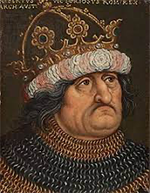Albert I: King of Germany
Albert I was King of Germany for a decade on either side of the turn of the 14th Century. His reign came to a violent end. 
He was born in July 1255 in Rheinfelden. His father was the eventual King Rudolf I, and his mother was Gertrude of Hohenberg. When Albert was born, no one sat on the German throne. King Conrad IV had died the year before, and it took Rudolf nearly two decades to consolidate his power. He was crowned in 1273. That very next year, Albert married Elizabeth of Carinthia. They had 12 children, 11 of whom lived into adulthood: Anna (1280), Agnes (1281), Rudolf (1282), Frederick (1289), Leopold (1290), Catherine (1295), Albert (1298), Henry the Gentle (1299), Otto (1301), and Elizabeth and Gutta (birth years uncertain). Rudolf had for years sought to have Albert co-crowned King of Germany, as had happened for several previous rulers, but the German nobles wouldn't agree. When Rudolf died, in 1291, the prince-electors chose as their next monarch not Albert but Adolf, Count of Nassau. Albert, lacking support, had to go along. Adolf did not endear himself to his people, however, and further alienated many people by getting involved in an internal struggle in Thuringia. Meanwhile, more and more princes threw in their lot with Albert, who raised an army and, in 1298, challenged Adolf to battle. The then-king agreed, and the result was the Battle of Göllheim, which resulted in a victory for Albert and the death of Adolf. The prince-electors then chose Albert to be King of Germany, and he was so crowned at Aachen Cathedral on August 24. Albert inherited Adolf's mistrust toward the French monarch, King Philip IV. Adolf had gone so far as to enter into an alliance with England's King Edward I to fight against France. The opposition of Pope Boniface VIII, punctuated by a threat of excommunication, to such an endeavor was enough for Adolf to decide against fighting. That same pope came out publicly against the election of Albert as German monarch, and so Albert, in an attempt to make amends, not only rejected any further talk of war but also strove to endear France to him, in 1299 signing a treaty and offering his son Rudolf as a husband to Philip's sister Blanche. That arrangement held, and the pope gave Albert his blessing in 1303. Albert looked closer to home to press his advantage, installing his son Rudolf as King of Bohemia when the popular Wenceslaus III died, in 1306. Albert also followed in his father's footsteps in wading into the still burning situation in Thuringia. Albert found defeat at the Battle of Lucka in 1307. Like several of his predecessors, Albert suffered from a lack of support among the many German princes and nobles. One such was his nephew Duke John, who intercepted Albert on his way to put down a revolt in Swabia and killed the king, at Windisch on the Reuss, on May 1, 1308. |
|
Social Studies for Kids
copyright 2002–2026
David White




